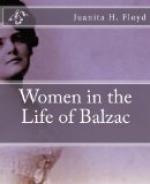Whether Balzac was fickle in his nature, or whether he was trying to convince Madame Hanska that she was the only woman for whom he cared, one finds, throughout his letters to her, various comments on Madame de Girardin, some favorable, some otherwise. He admired her beauty very much, and was saddened when, at the height of her splendor, she was stricken with smallpox. He was grateful to her for the service she rendered him in arranging for the first presentation of his play Vautrin, throughout the misfortune attending this production she proved to be a true friend. Although he accepted her hospitality frequently, at times being invited to meet foreigners, among them the German Mlle. De Hahn, enjoying himself immensely, he regretted the time he sacrificed in this manner, and when he quarreled with her husband, he expressed his happiness in severing his relations with them. While a charming hostess at a small dinner party, she became, Balzac felt, a less agreeable one at a large reception, her talents not being sufficient to conceal her bourgeois origin.
Madame de Girardin was in the country near Paris when she heard the sad news of the death of the author of the Comedie humaine. The shock was so great that she fainted, and, on regaining consciousness, wept bitterly over the premature death of her fried. A few years before her own death, in 1855, Madame de Girardin was greatly depressed by painful disappointments. The death of Balzac may be numbered as one of the sad events which discouraged, in the decline of life, the heart and the hope of this noble woman.
Madame Desbordes-Valmore was another literary woman whom Balzac met in the salon of Madame Sophie Gay, where she and Delphine recited poetry. Losing her mother at an early age under especially sad circumstances and finding her family destitute, after long hesitation, she resigned herself to the stage. Though very delicate, by dint of studious nights, close economy and many privations, she prepared herself for this work. At this time she contracted a habit of suffering which passed into her life. She played at the Opera Comique and recited well, but did not sing. At the age of twenty her private griefs compelled her to give up singing, for the sound of her own voice made her weep. So from music she turned to poetry, and her first volume of poems appeared in 1818. She began her theatrical career in Lille, played at the Odeon, Paris, and in Brussels, where she was married in 1817 to M. Valmore, who was playing in the same theater. Though she went to Lyons, to Italy, and to the Antilles, she made her home in Paris, wandering from quarter to quarter.




